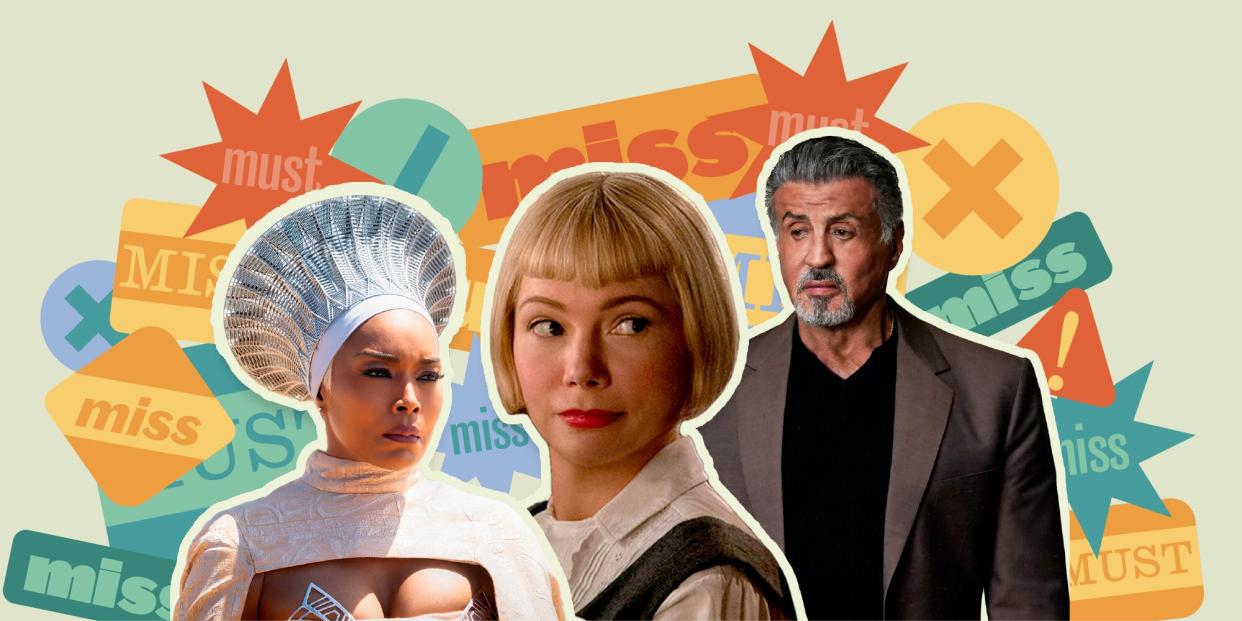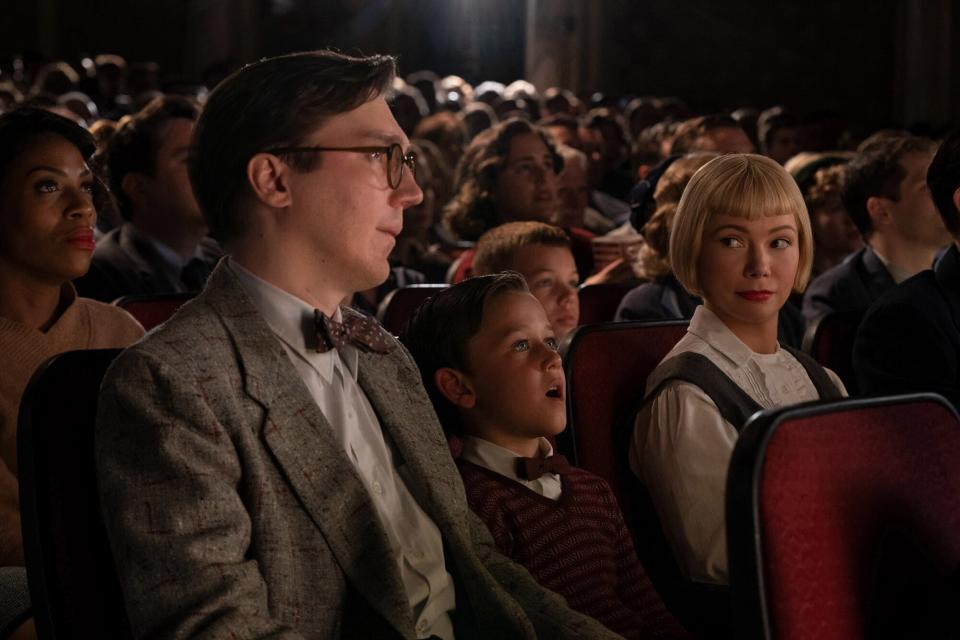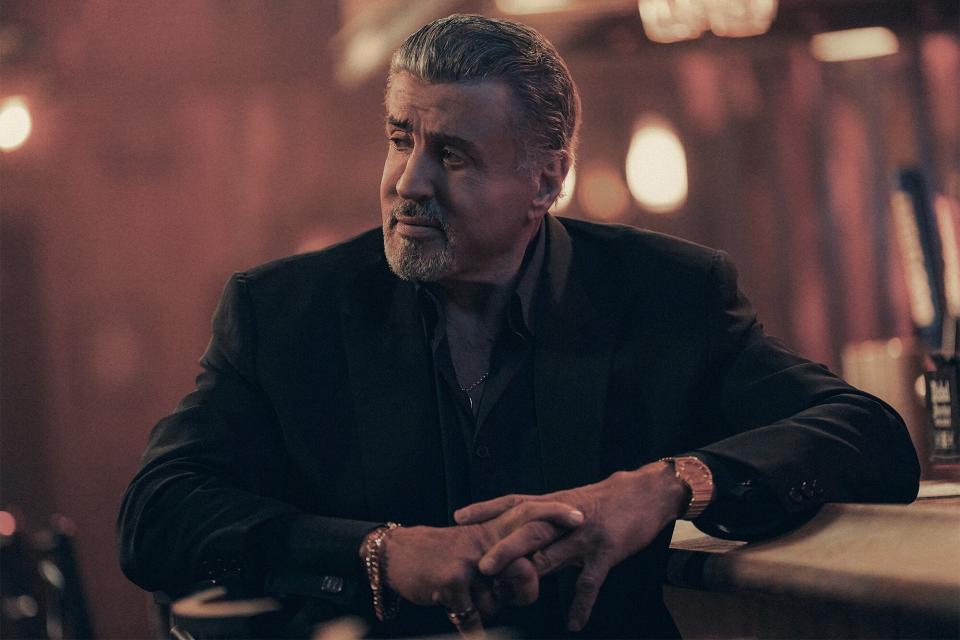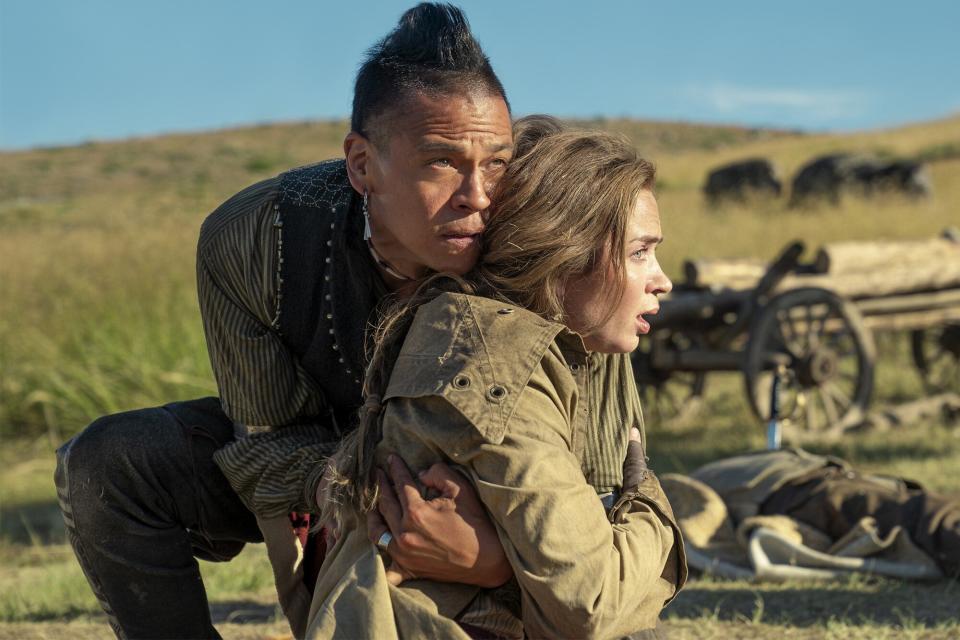Wakanda Forever is a moving requiem, Sly Stallone is a boomer bull in a millennial china shop in Tulsa King

- Oops!Something went wrong.Please try again later.
- Oops!Something went wrong.Please try again later.
- Oops!Something went wrong.Please try again later.
- Oops!Something went wrong.Please try again later.
- Oops!Something went wrong.Please try again later.
- Oops!Something went wrong.Please try again later.
Marvel / Universal / FOX
The Fabelmans
In theaters now

Universal Paul Dano and Michelle Williams in 'The Fabelmans'
"Family, art, life — it will tear you in two," a wild-haired Uncle Boris (Judd Hirsch) advises his young nephew, Sammy (newcomer Gabriel LaBelle), midway through The Fabelmans. He would know; he once put his head in lions' mouths for a living. Sammy doesn't want to join the circus, but he does very much want to make movies, and Steven Spielberg's latest turns out to be a deeply personal gaze into another kind of maw: his own biography.
Because it's Spielberg, it's all beautifully, meticulously rendered, and not a little glazed in wistful sentiment: an infinitely tender, often misty ode to the people who raised him and the singular passion for cinema that shaped him. That mist burns away as the movie goes on, though, in part because Michelle Williams gives such a fine-grained and devastating performance as Sammy's mother, Mitzi, a fierce, fragile woman whose own thwarted dreams have landed her in a life she doesn't recognize.
She could have been a world-class concert pianist, or maybe a dancer; instead she's a suburban housewife in early-1950s New Jersey, married to a faultlessly kind man named Burt (Paul Dano), a scientist who adores her, and mother to Sammy and his three younger sisters. Together they share a bustling, cheerfully secular Jewish home whose dinner table frequently includes at least one cantankerous grandmother and, nearly always, Uncle Bennie (Seth Rogen).
Unlike Boris, Bennie is not actually an uncle; he's Burt's best friend and coworker, though his enduring attachment to the Fabelmans may have more to do with Mitzi than anyone has cared to notice — except Sammy, who sees a lot through the little film camera he's always toting around like a fifth appendage. Two family relocations, first to Arizona and then Northern California, land him in a high school full of "giant sequoias" who have a lot of words, none of them kind, for Jews. But there are also pretty shiksa girls to flirt with, increasingly elaborate Super 8 movies to make, and a new kind of unraveling at home to distract him.
The unhurried, carefully observant script, cowritten with Tony Kushner, toggles gently between comedy and pathos; Oscar winner Janusz Kamiński (Saving Private Ryan, Schindler's List) oversees the swooping pans and zooms of the rich cinematography, and John Williams contributes a lofty, glimmering score. As much as it is Spielberg's personal history, The Fabelmans is also a fervent, hand-on-heart testament to the eternal lure of movies, made by one of the foremost magicians of the craft. If it all feels a little sanitized and idealized, who more than Spielberg has earned the right to revisit his stardust memories? Grade: B+ — Leah Greenblatt
Black Panther: Wakanda Forever
In theaters now

Eli Adé/Marvel Studios
Where can a superhero story that has lost its superhero go? Black Panther: Wakanda Forever ultimately finds a new path forward, though director Ryan Coogler's grand, somber requiem makes it clear in nearly every scene that the late Chadwick Boseman is irreplaceable, both on and off screen.
This is a movie very much in mourning for the man it lost — as a star, a colleague, and a friend — which seems like strange if not uncharted territory for a comic-book universe in which death is a Snap, and resurrection rarely less than another sequel or end-credits sequence away. The result still pounds with busy CG spectacle and, at just under three hours, more mythology than any non-Marvel head may strictly need. But it's also contemplative, character-driven, and frequently lovely: a faithful genre player imbued with a rare visual richness and real, painful poignancy.
King T'Challa's death from an unspecified illness takes place before the title card, leaving his sister Shuri (Letitia Wright), his mother Queen Ramonda (Angela Bassett) and a kingdom bereft. Global villainy, though, allows little time for grief, and even less for story exposition; soon there's a new conflicted antihero, Namor (the brooding Mexican actor Tenoch Huerta), ancient ruler of an endangered deep-sea Mayan civilization with its own people and resources to protect, and an increasingly antagonist U.S. government to address.
Fending off these new threats means marshaling the full forces of the Wakanda diaspora, including Danai Gurira's ferociously loyal general Okoye, Winston Duke's towering warrior M'Baku, and Lupita Nyong'o's retired spy Nakia, now living in self-imposed exile. The face-offs that follow inevitably take up much of the script's real estate, clangorous air-land-and-sea battles that travel from Boston bridges and Wakandan city centers to the ocean floor; the most striking thing about the movie, though, may be the amount of stillness it allows for in between — and also what a matriarchy it is, both by nature and nurture. Without their king, Wakanda has become a queendom from the top down, overseen by Bassett's regal, ageless Ramonda, the gorgeously daunting Gurira, and Wright, who rises to fill her dramatically expanded role with feline grace and vulnerability.
Coogler also stacks his backline with talented women, including production designer Hannah Beachler and costumer Ruth E. Carter, who both won well-deserved Oscars for the first film. Their shared vision of Afro-futurism feels lush and joyful and beautifully specific set against the usual white noise of Marvel fanfare, even (or almost especially) in darker moments, like the pristine rituals of a funeral scene. Wakanda is still clearly a Marvel property, with all the for-the-fans story beats and secondary characters its ever-expanding universe requires. And a Black Panther without Boseman is undoubtedly nothing like the film's creators or any of its cast wanted it to be. But the movie they've made feels like something unusually elegant and profound at the multiplex; a little bit of forever carved out for the star who left too soon. Grade: B+ — Leah Greenblatt
Tulsa King
Premieres Sunday on Paramount+

Brian Douglas/Paramount+ Sylvester Stallone in 'Tulsa King'
A ridiculous drama that could turn into a wry comedy, Tulsa King stars Sylvester Stallone as Dwight Manfredi, a 75-year-old mobster fresh off a 25-year prison sentence. His New York bosses send him to Tulsa, where he sets up shop in a hotel and becomes the unwanted business partner of a pot shop-owner (Martin Starr). The concept here is simple: One fish out of two waters. But in a lame non-twist, this unfrozen caveman gangster does just fine. Right off the plane, he meets a trusty cabbie named Tyson (Jay Will), who becomes his full-time driver. And when he meets a woman named Stacy (Andrea Savage) at a bar, she wastes no time asking to see his mini-bar.
It's an awful lot of boomer wish-fulfillment from Yellowstone creator Taylor Sheridan, though the first two episodes can seem oddly sensitive to the allegations that the writer's output leans arch-conservative. Yes, Dwight does go off on a long tangent complaining about the way the world is now: "What the f--- is it with the pronouns?" But he's obviously a nice gangster, with no real threats. The bad criminals are vain weaklings. Most Tulsans think Dwight's awesome.
The best moments are the lighthearted ones. There's a scene where Stallone gets to act high as a kite, which is just delightful. The actor's best moments are quiet: Ordering ribs at a lonely bar, wearing reading glasses while he types. The question for Tulsa King going forward is whether it can complicate Dwight's archaic act or sanctify him as a boomer bull in a millennial china shop. Right now, it's a frictionless fantasy about making instant friends, attracting younger women, and instantly knowing everything about the legal pot industry. Grade: C+ —Darren Franich
The English
Streaming now on Amazon

Diego Lopez Calvin/Drama Republic/BBC/Amazon Studios
This six-part western mostly gets the job done as an eccentric, guns-blazing thriller. Emily Blunt and Chaske Spencer play Cordelia Locke and Eli Whipp, riders on a vengeance trail carving a bloody swath across the Great Plains. It's 1890, and she's a Londoner far from home. Wearing a ball gown on horseback, she's great with a bow and arrow. He's a different kind of paradox, a Pawnee in a cavalry uniform, at once victim and perpetrator of America's western expansion. They meet-bloody when they're both taken captive by a grandiloquent hotelier (Ciarin Hinds), which leads to two distinct showdowns in the first half hour. The English doesn't waste time.
Writer-director Hugo Blick films handsomely, with long shots that make his characters look like painted sunshadows on distant horizons. But he also embraces the genre's guttural thrills. Every episode has a gun duel, or a high-tension face-off with quick-cut close-ups to easily reachable weapons. The central duo feels torn off the cover of an especially progressive pulp paperback. Aristocratic Cordelia is on a genuine quest, seeking a mystery man who had something to do with her son's death. Eli just wants to get the Nebraska acreage owed him by the Homestead Act.
He agrees to get Cordelia where she needs. They meet bad men, tough women, liars, crooks, and worse. For three blissfully bleak episodes, The English comes off like a classic odyssey, less focused on the eventual destination than the windblown stops along the way. And then the wheels start to come off. What had been evocatively mysterious gets all laid out, with flashbacks and monologues that put a fine point on multiple impressively heavy themes. Rafe Spall starts chewing the scenery as a super-predator who incarnates every bad thing about America, masculinity, capitalism, and white supremacy. It's a mile-high performance that overwhelms the show's dark humor, and the later episodes move more stolidy towards an inevitable finale. Still, it's worth sticking with The English just for the lead performances. For Blunt, it's another opportunity to play battle-hardened emotional resolve with a wink. And the lesser-known Spencer should be much better known after this, since he turns Eli into a walking tall tale of mythic nobility and no-nonsense toughness. Grade: B —Darren Franich
Related content:

